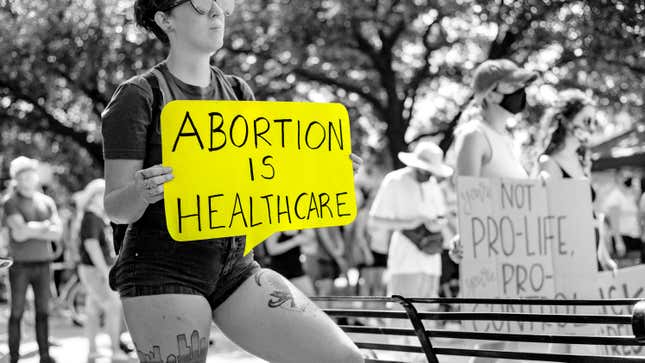At The Rally For Abortion Justice, Black and Brown Voices Will Finally Be The Loudest
This weekend the nation mobilizes for reproductive justice
In Depth

On Saturday, October 2nd, the organizers behind the Women’s March will be staging marches and rallies across the country to protest restrictive abortion legislation like the law that just took effect in Texas. Since its inception, the Women’s March has come under heavy scrutiny for centering white cis women in its mission to “harness the political power” of women across the country. This year, the organization made a more conscious effort to commit to a grassroots approach, inviting activists and community leaders to host their own pro-abortion rallies in their respective states amongst their respective communities. The result is the Rally for Abortion Justice: over 600 “sister marches” occurring in concert with the main rally that will take place in Washington, DC.
In the lead-up to the events, Jezebel spoke with three organizations who have joined their power with that of the Women’s March team in order to create what they all hope to be a more equitable abortion-focused set of demonstrations that could potentially turn the tide in how the country talks about and legislates the procedure.
Michelle Colon, Co-Founder of
Michelle Colon is an abortion freedom fighter, and the organization she founded, Sistahs Helping Every Woman Rise and Organize (SHERO), is steeped in the fight to bring reproductive justice to the Black and brown communities of Mississippi. Colon made it abundantly clear that while her organization will be hosting a sister event to the Women’s March DC rally, it will be and must be more than a vague symbolic attempt to protect women’s rights. “I was very adamant that I’m not going to do a ‘women’s march,’ because so many people who show up for these marches, especially here in Mississippi, did not come out to support abortion rights. There are still a lot of people who want to be ‘pro-woman,’ but they don’t want to talk about abortion,” Colon told Jezebel.
While conversations about abortion have long been the clarion call of white feminists who view reproductive justice as the be-all-end-all of the feminist movement, Colon brings a perspective to that conversation that fully encompasses the history of Black and brown people and the medical discrimination they’ve faced in this United States for decades. This, she explains, is why it’s so important to be a source of information and empathy in her community. “It’s a huge problem for us because we already experience various biases,” Colon said. “When we go to the doctor, there’s coercion, disrespect, devaluing. So there’s a lot of obstacles for Black and brown women [when going] to the doctor, period. [We] have a history in the medical healthcare system when it used to be, [doctors] didn’t want to provide us with care or they wanted us to be guinea pigs in their experiments.” In some cases, Colon said, “they’ve allowed us to die.”
-

-

-

-

-

-

-

-

-

-

-

-

-

-

-

-

-

-

-

-

-

-

-

-

-

-

-

-

-

-

-

-

-

-

-

-

-

-

-

-








































